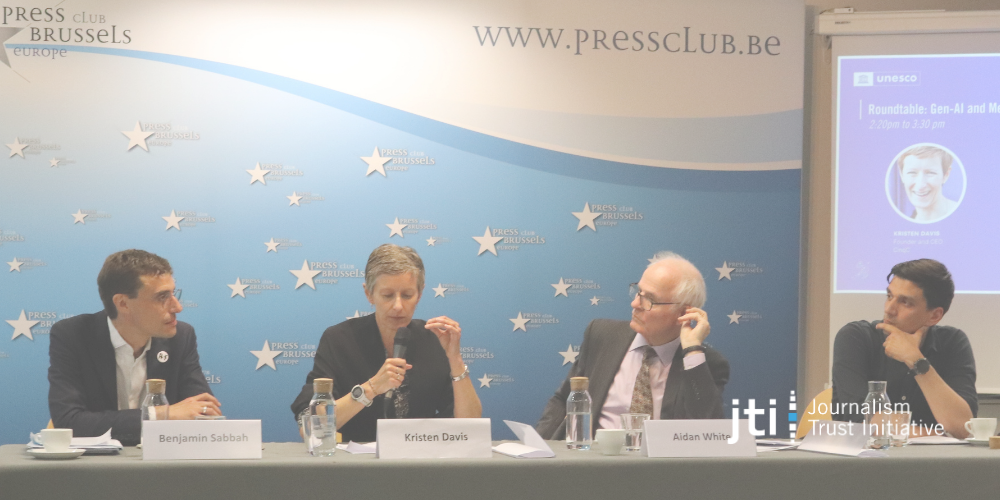To mark World Press Freedom Day, Reporters Without Borders (RSF) and UNESCO organised a conference on Tuesday, 6 May at the Press Club Brussels Europe to explore the impact of generative artificial intelligence (AI) on press freedom and the media in Southeast Europe. This crucial event served as a reminder that information is a vital public good and aimed to encourage the media to use generative AI responsibly and ethically.
On Tuesday, 6 May at the Press Club Brussels Europe, media experts and AI specialists from Southeast Europe gathered to discuss the major promises and risks associated with the integration of generative AI in newsrooms. While there is a high risk of eroding trust in the media and press freedom is already limited, their goals for the Balkan countries are clear: promote self-regulation for responsible use in order to preserve the quality of information, encourage a critical culture around digital technology and AI, and innovate responsibly.
The day was also an opportunity for RSF to present the practical tools offered by the Journalism Trust Initiative (JTI) standard. The JTI certification, a project launched by RSF and developed with industry experts to ensure the news media adhere to transparent, professional standards, is based on 130 criteria. While one of these specifically addresses transparency in the use of artificial intelligence, the entire framework provides a comprehensive structure to ensure newsroom ethics and responsibility, and to strengthen the reliability of information in the digital age. In Southeast Europe, around 100 media outlets have started the process to become JTI certified, and four have reached full certification. The certified outlets are: Faktoje in Albania, Center for Investigative Reporting (CIN) in Bosnia, as well as Crime and Corruption Reporting Network – KRIK and Istinomer in Serbia.
Given the region’s role as a cultural crossroads and the candidacy of certain Balkan countries for European Union membership, the issue of regulating the use of AI in light of the risks it poses to the dissemination of reliable information is crucial. We are very pleased to have opened a space for dialogue with UNESCO alongside AI and media experts, and to be able to propose the JTI as a concrete tool to address these challenges, especially in countries where false information, propaganda, and corruption are rampant. The JTI helps media outlets around the world to use AI responsibly. It is also a tool intended for platforms and all stakeholders in the sector to identify trustworthy media.
Benjamin Sabbah, Director – Journalism Trust Initiative, Reporters Without Borders
Journalism exists to serve the public interest, and for that reason, we cannot rely solely on the most powerful capabilities of AI tools without careful consideration. The real challenge for the media may not only be to understand what AI can do, but to identify how to responsibly integrate these tools into newsroom activities while upholding journalistic values.
Borislav Vukojević, Consultant for UNESCO and Professor at the Faculty of Political Science, University of Banja Luka (Bosnia and Herzegovina)
AI is not a neutral tool and it is often discriminatory, as shown by a study we conducted within our media organization. AI indeed inherits content from vast databases that reflect existing and past societal attitudes. If AI is programmed or trained on data that is discriminatory towards women, minorities, or other marginalized groups, discrimination becomes systemic and automatic. We must understand that the responses from these tools cannot be accepted uncritically, especially when they are used in sectors such as human resources, education, media, and even the judicial system.
Andrijana Pisarevic, Journalist, Capital.ba (Bosnia and Herzegovina)
Economically weakened and now facing competition from chatbots, that do not adhere to ethical standards for journalism, media outlets may see generative AI as an opportunity to increase productivity and speed. However, this automation can lead to shortcuts that cause serious ethical problems without the solid safeguards inherent to professional journalism. It is with this in mind that RSF launched the Spinoza project in November 2023 – a generative AI tool designed to help journalists address climate change issues by integrating journalistic values from the very start. The first results of this work were presented in the report “SpinozIA, towards augmented and ethical journalism,” published in February 2025 during the Paris Summit on Artificial Intelligence for Action.
Regulating the use of AI: a European challenge
Several Balkan countries, such as Albania, Montenegro, North Macedonia, and Serbia, are candidates for EU membership. The EU is a pioneering power in regulating digital platforms and AI andpromoting the right to reliable information: It has adopted several landmark laws, including the Digital Services Act (DSA), the AI Act, and the European Media Freedom Act (EMFA). To stregnthen these efforts, RSF has made several recommendations to EU authorities: stronger regulation of platforms and AI-focused companies, ambitious public policies to support media and press councils, and true institutional governance in this area.



